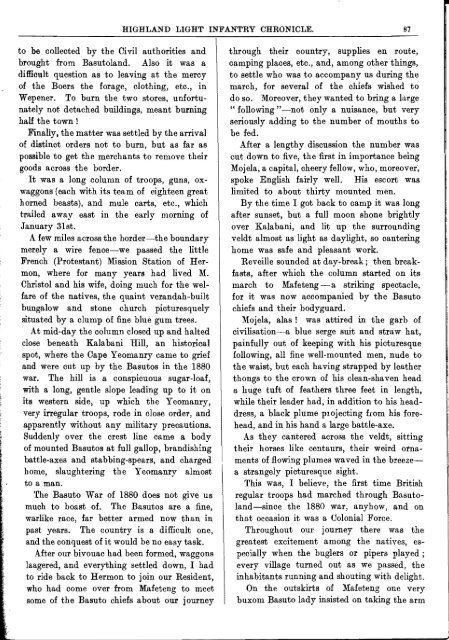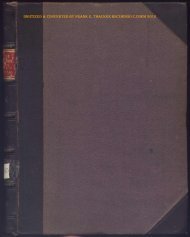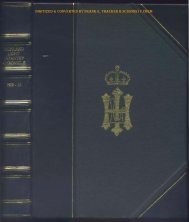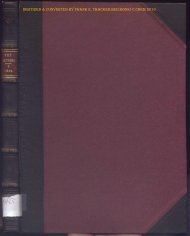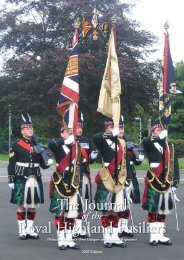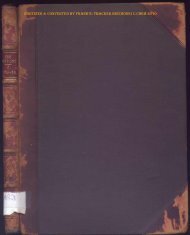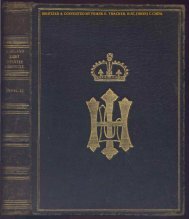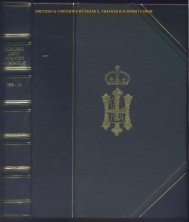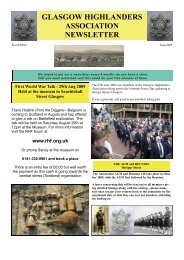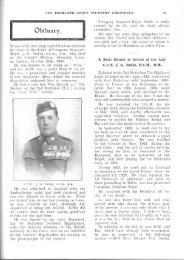HLI Chronicle 1914 - The Royal Highland Fusiliers
HLI Chronicle 1914 - The Royal Highland Fusiliers
HLI Chronicle 1914 - The Royal Highland Fusiliers
- No tags were found...
Create successful ePaper yourself
Turn your PDF publications into a flip-book with our unique Google optimized e-Paper software.
HIGHLAND LIGHT INFANTRY CHRONICLE. 87to be collected by the Civil authorities andbrought from Basutoland. Also it was adiffioult question as to leaving at the mercyof the Boers the forage, clothing, etc., inWepener. To burn the two stores, uufortunatelynot detached buildings, meant burninghaH the town! .Finally, the matter was settled by the arrivalof distinct orders not to burn, but as far aspossible to get the merchants to remove theirgoods across the border.It was a long column of troops, guns, oxwaggons(each with its team of eighteen greathorned beasts), and mule carts, etc., whichtrailed away east in the early morning ofJanuary 31st.A few miles across the border-the boundarymerely a wire fence-we passed the littleFrench (Protestant) Mission Station of Hermon,where for many years had lived M.Christol and his wife, doing much for the welfareof the natives, the quaint verandah-builtbungalow and stone church picturesquelysituated by a clump of fine blue gum trees.At mid-day the column closed up and haltedclose beneath Kalabani Hill, an historicalspot, where the Cape Yeomanry came to griefand were cut up by the Basutos in the 1880war. <strong>The</strong> hill is a conspicuous sugar-loaf,with a long, gentle slope leading up to it onits western side, up which the Yeomanry,very irregular troops, rode in close order, andapparently without any military precautions.Suddenly over the crest line came a bodyof mounted Basutos at full gallop, brandishingbattle-axes and stabbing-spears, and chargedhome, slaughtering the Yeomanry almostto a man.'fhe Basuto War of 1880 does not give usmuch to boast of. <strong>The</strong> Basutos are a fine,warlike race, far better armed now than inpast years. <strong>The</strong> country is a difficult one,and the conquest of it would be no easy task.After our bivouac had been formed, waggonslaagered, and everything settled down, I hadto ride back to Hermon to join our Resident,who had come over from Mafeteng to meetsome of the Basuto chiefs about our journeythrough their country, supplies en route,camping places, etc., and, among other things,to settle who was to accompany us during themarch, for several of the chiefs wished todo so. Moreover, they wanted to bring a large" following" -not only a nuisance, but veryseriously adding to the number of mouths tobe fed.After a lengthy discussion the number wascut down to five, the first in importance beingMojela, a capital, cheery fellow, who, moreover,spoke English fairly well. His escort waslimited to about thirty mounted men.By the time I got back to camp it was longafter sunset, but a full moon shone brightlyover Kalabani, and lit up the surroundingveldt almost as light as daylight, so canteringhome was safe and pleasant work.Reveille sounded at day-break; then breakfasts,after which the column started on itsmarch to Mafeteng -a striking spectacle,for it was now accompanied by the Basutochiefs and their bodyguard.:\Iojela, alas I was attired in the garb ofcivilisation-a blue serge suit and straw hat,painfully out of keeping with his picturesquefollowing, all fine well-mounted men, nude tothe waist, but each having strapped by leatherthongs to the crown of his clean-shaven heada huge tuft of feathers three feet in length,while their leader had, in addition to his headdress,a black plume plOjecting from his forehead,and in his hand a large battle-axe.As they cantered across the veldt, sittingtheir horses like centaurs, their weird ornamentsof flowing plumes waved in the breeze·a strangely picturesque sight.This was, I believe, the first time Britishregular troops had marched through Basutoland-sincethe 1880 war, anyhow, and onthat occasion it was a Uolonial Force.Throughout our journey there was thegreatest excitement among the natives, especiallywhen the buglers or pipers played;every village turned out as we passed, theinhabitants running and shoutiug with delight.On the outskirts of Mafeteng oue verybuxom Basuto lady insisted on taking the arm


